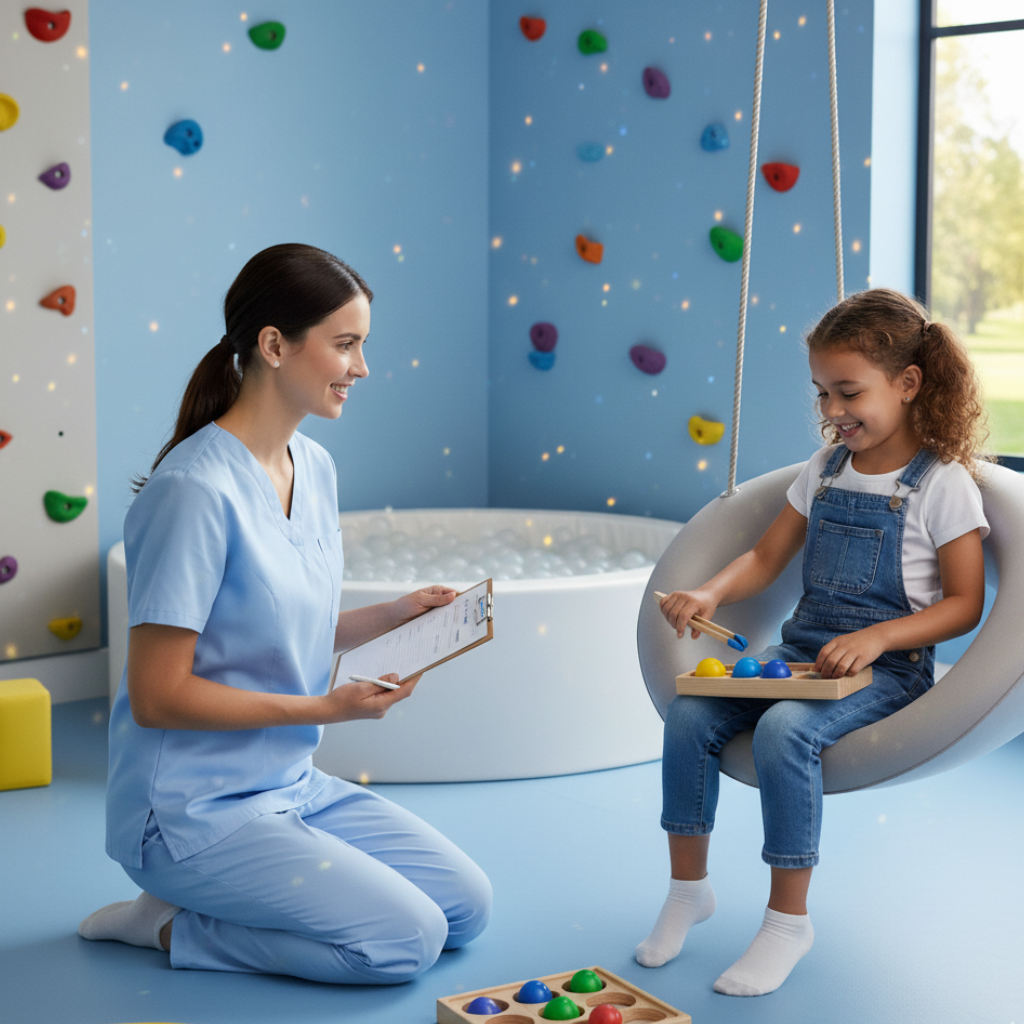
Assessment
Understand your child better
Free45 min
Online/In Person
At WeeCare, our assessment helps parents gain a clear understanding of their child’s development. We carefully evaluate key areas such as motor skills, sensory processing, communication, social-emotional growth, and daily living abilities. Using a combination of parent interviews, observations, and standardized tools, we create a child-friendly and comprehensive profile.
After the assessment, you receive a detailed report outlining your child’s strengths and areas that need support, along with practical recommendations for therapy, school adjustments, and home strategies. This forms the foundation for an individualized plan to help your child thrive.
Initial Consultation – A friendly discussion with parents to understand concerns, medical history, and goals.
Observation of the Child – Watching how your child plays, interacts, and responds in different situations.
Standardized Testing – Using reliable tools (like Sensory Profile-2, EASI, OPT, BOT-2, PDMS-2, etc.) to measure skills.
Comprehensive Skill Check – Looking at sensory processing, motor skills, handwriting, daily living skills, and behavior.
Parent Input – Your observations and feedback are included to get a complete picture.
Detailed Report – A clear summary of your child’s strengths, challenges, and assessment results.
Personalized Recommendations – Practical strategies and therapy suggestions tailored for your child.
Next Steps – Guidance on therapy plans, home activities, and how we can work together to support progress.
Sensory Processing / Sensory Integration
Looks at how your child responds to different sensory inputs (sound, touch, movement, vision, taste, smell).
Identifies over-sensitivity (e.g., covering ears) or under-sensitivity (e.g., seeking constant movement).
Why it matters: Sensory challenges can affect attention, learning, emotions, and behavior.
Motor Skills Assessment
Fine Motor: Hand strength, grasp, finger coordination, writing readiness, use of tools.
Gross Motor: Balance, coordination, posture, walking, running, jumping, and ball skills.
Why it matters: Strong motor skills help children participate in play, school, and daily tasks.
Visual-Motor and Visual Perception
Assesses hand-eye coordination, copying, drawing, puzzles, visual discrimination, and spatial awareness.
Why it matters: Supports handwriting, reading, and classroom learning.
Handwriting Assessment
Reviews pencil grip, speed, legibility, control, and overall writing ability.
Why it matters: Handwriting is essential for school success and confidence.
Daily Living Skills / Functional Abilities
Checks independence in eating, dressing, toileting, grooming, and other self-care tasks.
Why it matters: Builds confidence and reduces dependence on adults.
Social and Emotional Skills
Observes interaction with peers and adults, sharing, cooperation, and emotional regulation.
Why it matters: Good social-emotional skills support friendships, classroom behavior, and resilience.
Behavioral Patterns
Identifies behaviors like aggression, hyperactivity, repetitive actions, or withdrawal.
Examines possible triggers and links with sensory or emotional needs.
Why it matters: Understanding behavior helps create strategies that support positive habits.
Cognitive and Learning Abilities
Focuses on attention, memory, sequencing, reasoning, and problem-solving.
Why it matters: These skills are directly linked to school readiness and learning.
Adaptive Functioning
Looks at how your child manages daily routines, adapts to changes, and handles new situations.
Why it matters: Prepares children to cope better in real-life environments.
Specialized / Diagnostic Assessments
Includes tools for Autism Spectrum Disorder (ASD), ADHD, Dyspraxia, and other developmental concerns.
Why it matters: Helps with accurate identification and planning for the right interventions.
Motor Skills
Fine Motor Skills: Includes hand strength, grasp, finger coordination, drawing, writing, and using tools like pencils or scissors.
→ Why it matters: Strong fine motor skills are important for school tasks, play, and independence in daily activities.
Gross Motor Skills: Balance, posture, running, jumping, climbing, and ball skills.
→ Why it matters: These skills help your child move confidently, play with peers, and participate in sports or outdoor activities.
Sensory Processing
How your child reacts to sound, touch, movement, vision, taste, and smell.
Identifying over-sensitivity (e.g., covering ears, avoiding textures) or under-sensitivity (e.g., constantly moving, seeking pressure).
→ Why it matters: Sensory processing affects attention, learning, emotions, and behavior. A child who feels overwhelmed or under-stimulated may struggle in school or at home.
Communication and Language
Receptive Language: Understanding words, instructions, and questions.
Expressive Language: Using words, sentences, or gestures to share thoughts and needs.
Social Communication: Skills like eye contact, turn-taking, initiating conversations.
→ Why it matters: Communication is the foundation for learning, making friends, and expressing needs.
Social and Emotional Skills
Interactions with peers and adults (sharing, playing, cooperating).
Emotional regulation (handling frustration, waiting, coping with change).
Understanding self and others (empathy, awareness of feelings).
→ Why it matters: Strong social-emotional skills help children build friendships, succeed in school, and feel confident in new situations.
Cognitive and Learning Abilities
Attention and focus on tasks.
Problem-solving, reasoning, and memory.
Ability to follow sequences and complete age-appropriate activities.
→ Why it matters: These skills are directly linked to academic readiness and overall learning.
Daily Living Skills
Independence in activities like eating, dressing, toileting, and personal hygiene.
Participation in family routines and school tasks.
Adjusting to new environments and transitions.
→ Why it matters: These skills make children more independent and confident in daily life.
Behavioral Patterns
Observing behaviors such as aggression, hyperactivity, repetitive actions, or withdrawal.
Identifying triggers for behaviors and how they connect to sensory or emotional needs.
→ Why it matters: Understanding behavior helps create strategies that reduce stress for the child and family, while supporting positive habits.


